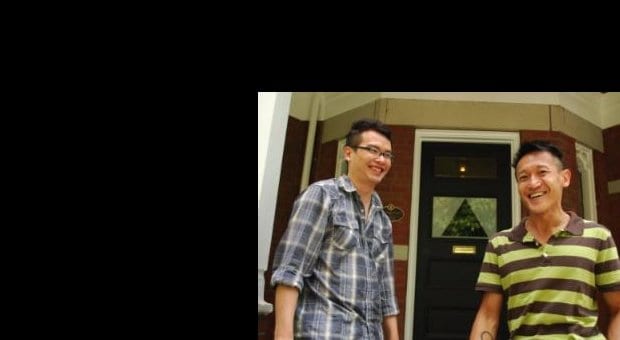Richard Utama says he’s met many Asian guys who are afraid to talk about HIV and safer sex.
That’s why he and the men’s health team at Asian Community AIDS Services (ACAS) worked together to create a new video (see below) he hopes will get the conversation started.
SexQ! is a new online PSA that follows two dudes who hook up for sex but ask some straight-up questions first, about drug use, gangbangs and fucking raw. “We were just like . . . this happens, why should we be different than any other culture?” says Utama, the men’s sexual health coordinator at ACAS. “We’re all gay guys . . . the only difference is maybe our skin colour.”
Fellow ACAS worker Christian Hui says Asian men can be uncomfortable talking about sex for a few reasons, including internalized homophobia, family values and disrespect for Asians in the queer community.
“On the desirability totem pole, so to speak, I think Asian gay men tend not to rank high,” Hui says. “If someone comes up to you and says, ‘Let’s fuck’ . . . are you gong to ask a lot of questions or are you going to do it? And are you going to be able to do it safely if you don’t know how to negotiate all these other things?”
Meanwhile, 4.8 percent of people in Ontario diagnosed with HIV in 2009 and 2010 were East or Southeast Asians. But ACAS suspects the number of HIV-positive Asians might be higher, because many people don’t get tested. Utama hopes the PSA will encourage guys to get tested.
For Hui, who is HIV-positive, making the PSA was a personal journey. Originally from Hong Kong, he moved to Canada in 1999 from the United States. He didn’t get involved with the gay scene until he was 20 and had moved to Toronto.
“The first time I walked into a gay bar . . . it was pretty segregated,” he says, remembering a sea of white guys with a few Asians sticking to the corners. On chat sites, he found many guys didn’t want to meet him when they found out where he was from.
Hui was also trying to figure out his sexuality while surrounded by terms he’d never learned before. “Barebacking? I didn’t know what that was — I had to look that up,” he says.
Going to the bathhouse was a whole other scene. “I was always a bit anxious,” Hui says. “Obviously, I would like to meet someone, but then I wasn’t really sure how to go about asking the right questions.
“If I’d seen the PSA when I was younger, then maybe I would have done things a little differently,” he says. He wants Asian guys who see the video to be inspired to ask their partners questions and take control of their health in the ways that he didn’t.
People may have ideas about who is comfortable talking about HIV and who isn’t. But Utama says that shame hides in unexpected places.
He remembers talking to an HIV-positive friend who was repeatedly hooking up with someone who, after a few encounters, disclosed that he was positive. “[The guy he hooked up with] actually got really upset,” Utama says. “So my friend actually came to me, asking for advice.”
Utama says the cry for help “baffled” him. “Like, wow. You’re an HIV educator, but you yourself are still having problems with disclosing.”
The video was shot in the span of one day in Utama’s condo, with Filipino director Ryan Logan at the helm. “I didn’t think it was going to be so professional . . . because we didn’t have that much money,” Utama says.
“We had a great time,” says Logan, who cut and edited the video himself. “It was great to see these guys participating in something they’ve never really done a lot of.”
Logan had good reason to be so committed to the project. He recalls finding out about an HIV-positive partner and feeling firsthand the shock and anxiety while waiting for his own test results.
“My world came crashing down,” says Logan, who says he got tested multiple times that year and started talking to clinic workers and counsellors about his fears. “Basically, I felt like I was alone in dealing with it.”
Besides getting people talking, the ACAS video promotes M2Men, a new iPhone app and text messaging service created by Toronto Public Health. M2Men helps hook guys up with nearby clinics, condoms and other health resources, and it blasts out alerts. It also promotes InSpot, an easy online outlet to tell a sex partner about an STI.
You can check out the video on YouTube and download the M2Men app for your iPhone here.


 Why you can trust Xtra
Why you can trust Xtra


